Lead generation quizzes are a powerful tool for businesses to engage their target audience and capture valuable information from potential customers.
These interactive quizzes not only increase website traffic but also help in segmenting and understanding your audience in a better way. By crafting a quiz that resonates with your audience’s interests and preferences, businesses can drive more conversions and increase brand awareness.
Implementing a
When automating
This article shows you how to make a
But first, what exactly is a
- What Is a
Lead Generation Quiz? - Why Quizzes Generate Leads
- Quiz Funnels Result In More Sales
- How Do
Lead Generation Quizzes Work? - 7 Types of
Lead Generation Quizzes - Building a Quiz with Ready-to-Use Templates
- Capturing Leads with Your Quiz
- Segmenting and Understanding Your Audience
- How To Make A
Lead Generation Quiz (in 5 Easy Steps) - Conclusion
- Frequently Asked Questions
What Is a Lead Generation Quiz?
A
The result may be a personality type – your interior decor personality or your jewelry style. Or it may diagnose a problem. Ot it could simply be a score in a knowledge test.
Why Quizzes Generate Leads
Why are quizzes so effective at generating leads?
It’s because quizzes are interactive.
They engage your visitors by asking them questions. And at the end of the quiz, there’s a result that the user wants. It could be a score, it could be a recommendation, or it could be a personality type.
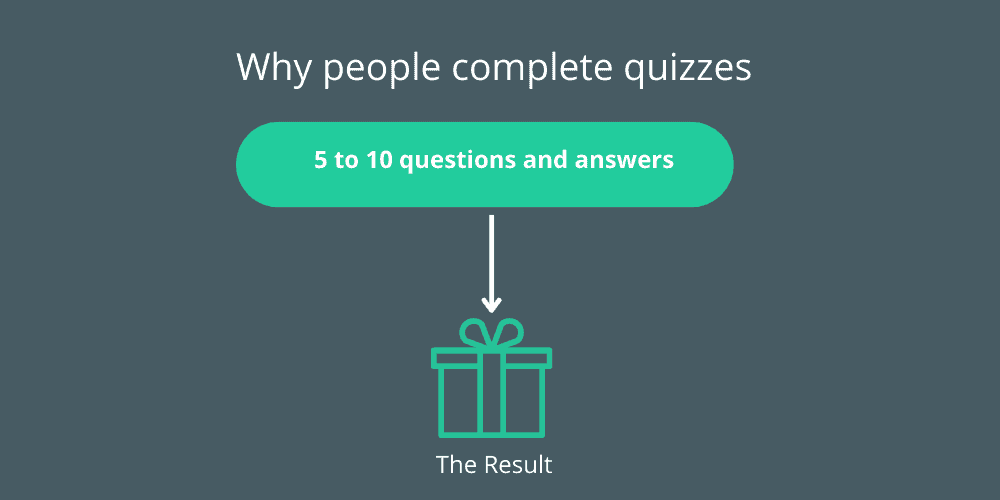
The quiz result gives the user an insight into themselves and that’s what keeps them engaged. It’s what makes quizzes different from surveys and it’s why they generate leads.
The reason a quiz work so well for lead generation is that once people have started answering questions, it’s much more likely that they will enter an email address.
Why is this so?
It’s because your visitor has already made a commitment: they have already engaged with your website. Quizzes take advantage of a phenomenon called completion bias: the tendency of people to feel compelled to complete a task once they have started it.
This is why lead gen quizzes have a far higher success rate than standard opt-in forms.
10% would be a very good success rate for an average opt-in form. By contrast,
Quiz Funnels Result In More Sales
A normal sales funnel draws people in through an ad or a piece of free content. But once on your website, a standard sales funnel treats everyone the same. It’s a one-size-fits-all approach.
But a quiz funnel offers people personalised results based on the answers they give. And this is what makes a quiz funnel so powerful. Here are some of the ways a quiz funnel can supercharge your marketing:
- People are more likely to share information and their email address when they are getting personalised feedback
- The answers people give to the quiz questions allow you to offer products and services that are directly relevant to them and this dramatically improves conversion rates.
- The answers people give to the quiz questions provide valuable data about your potential customers: you can use that data to develop products and services that answer their needs
- You can segment your audience, based on the answers they give to your quiz questions.
How Do Lead Generation Quizzes Work?
A
For example, a website selling watches might have a quiz titled “What’s your watch personality?”. The quiz shows the visitor different styles of watches and asks your visitor which best matches who they are.
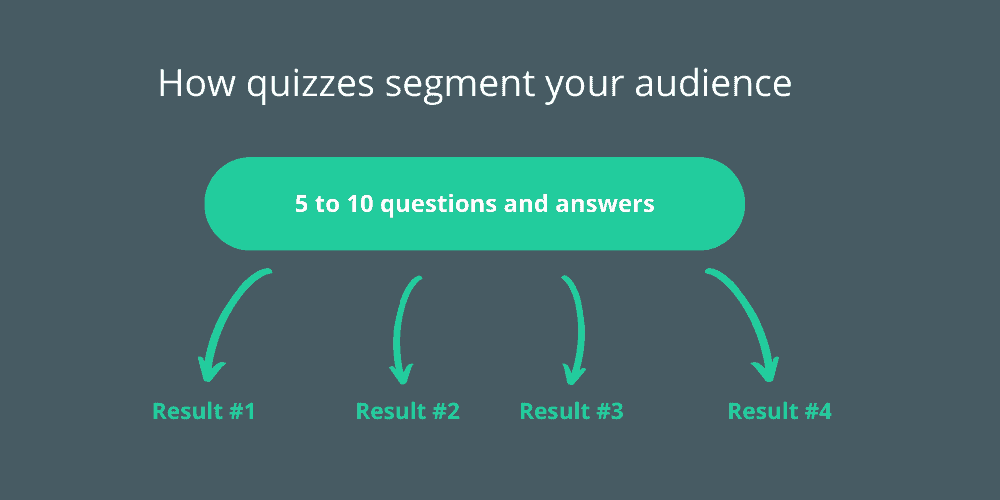
A health and fitness website, on the other hand, might have a quiz titled “How fit are you?”. The quiz would ask some questions that guide your visitor to the fitness program that best suits their level of fitness.
Once the quiz taker has completed the quiz, a lead generation form appears. This is where you ask your visitor for an email address where you can send the results of the quiz.
As soon as they enter their email address, the quiz then shows your visitor a brief version of the quiz result. They receive the full version, explaining which of your products or services best matches their needs, in an email.
7 Types of Lead Generation Quizzes
There are seven main types of quizzes for
1. Personality Quiz
The most popular type of lead quiz, by far, is the personality quiz.
This kind of quiz has an almost universal appeal because it feeds into two fundamental principles of human psychology:
Curiosity about ourselves – we’re all trying to work out what ‘make us tick’.
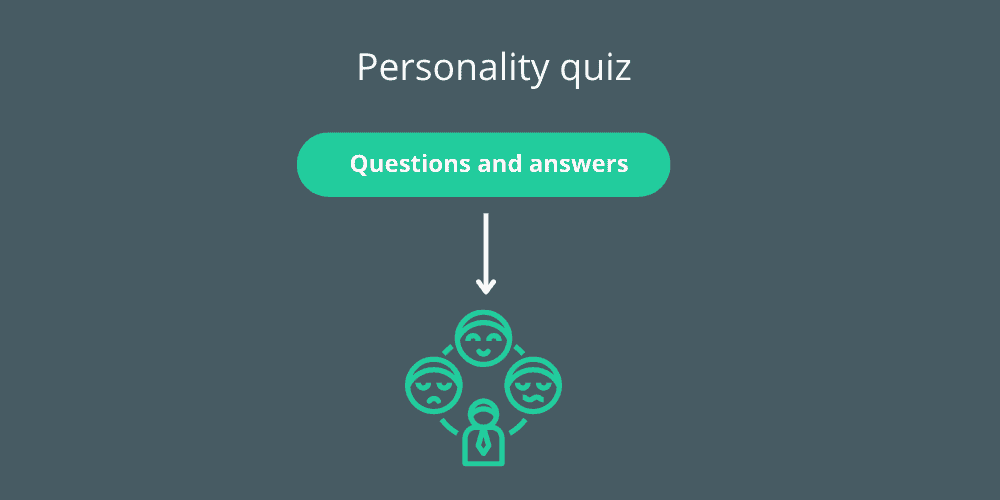
In the marketing space, personality quizzes often take the form of “What kind of an ‘x’ are you”.
The idea here is that whatever the product or service being sold, there’s one that matches your visitor’s personality.
Examples of personality quizzes:
- What’s your watch style?
- What’s your tech personality type
- What’s your shoe personality?
- What type of cyclist are you?
- What kind of blogger are you?
- What type of mom blogger are you?
2. ‘Do You Have What It Takes To Be An X?’ Quiz
This is a good type of quiz to use if you’re in a niche that involves self-improvement, fitness, or personal growth. Or any area that people find challenging:
Examples:
- Do you have what it takes to give up your salary & start a freelance business?
- Do you have an entrepreneurial mindset?
- Do you have what it takes to start an online business?
3. ‘What’s The Best Fit For You?’ Quiz
This is a good quiz to use when you have a product or service that can be customized to suit the user.
Examples:
- Which major is right for you?
- What career is best for you?
- Which vacation destination is right for you?
4. Assessment Quiz
This kind of
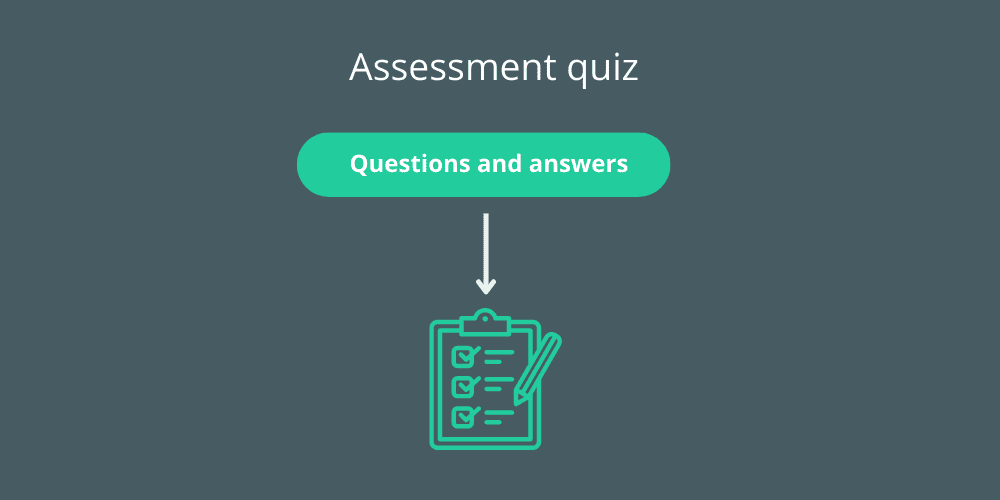
Examples of assessment quizzes:
- How good are you in relationships?
- Do you have a good work-life balance?
- Is it time for a cleanse?
- Are you ready to go paleo?
- Are toxins unknowingly affecting your body?
- What type of sleeper are you?
5. Problem Diagnosis Quiz
Most people will arrive on your website with a problem they want to solve. And that’s why this is another very popular type of online quiz.
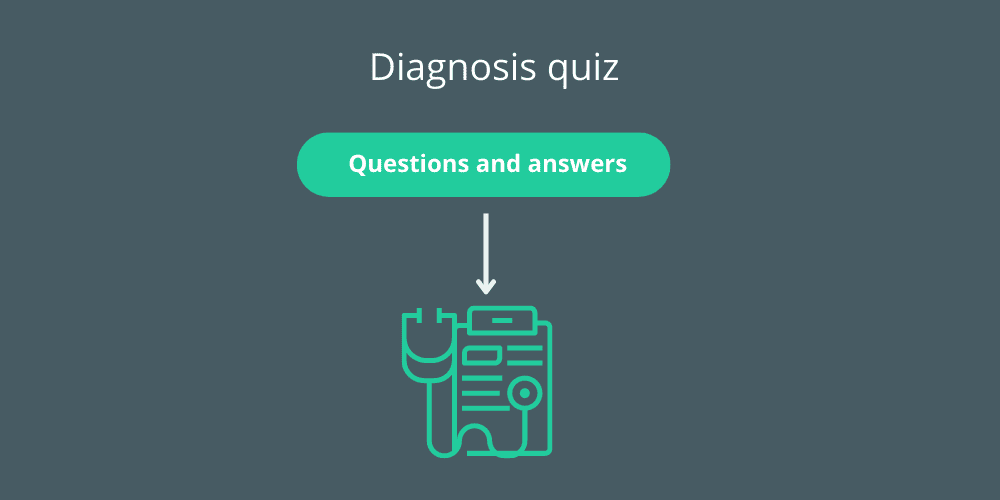
Examples of diagnosis quizzes:
- What’s wrong with your golf swing?
- Why aren’t you getting enough traffic?
- What’s wrong with your golf swing?
6. Scored Knowledge Quiz
This type of quiz is exactly what it sounds like: a test of your visitor’s knowledge of a particular topic. You can use these quizzes for
Examples of knowledge quizzes:
- Test your SEO knowledge
- How much do you know about WordPress?
- What’s your Health & Fitness IQ?
7. Product Recommendation Quiz
A product recommendation quiz asks your visitor a series of questions about their needs, preferences, or their problems.
The answers they give to those questions allow you to recommend products or services that best fit their needs.
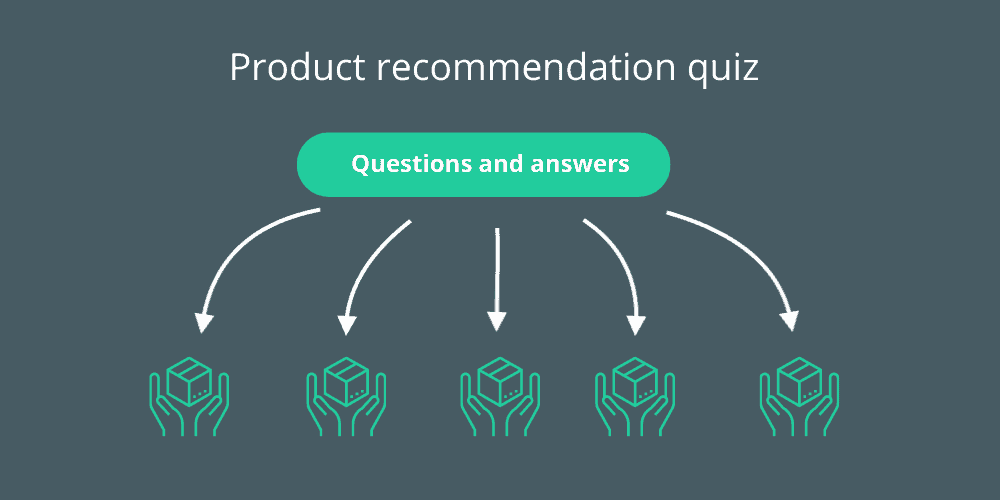
Building a Quiz with Ready-to-Use Templates
When it comes to creating an engaging
Quiz Templates from Interact
Interact offers a range of quiz templates designed for
- Beauty & Fashion
- Branding & Design
- Candles & Essential Oils
- Career
- Coffee & Tea
- Copywriting
- E-commerce
- Entrepreneurship
- Interior Design
- Jewelry
- Leadership
- Life Coaching
- Marketing
- Mental Well-Being
- Nutrition & Fitness
- Parenting
- Personal Development
- Personal Finance
- Photography
- Skin Care
- Travel
- Wedding
- Wellness
Once you have chosen your quiz template, you can then swap out the questions and the answers and replace the images with your own. You can customize the template as much or as little as you like.
Templates from Involve.me
Involve.me is another platform that offers a selection of lead-generation quiz templates. Their drag-and-drop builder allows you to quickly create quizzes without any technical skills. By gating quiz results with an email capture page, gathering leads becomes an effortless process. Involve.me’s templates are also easily customizable, ensuring your quiz retains your brand’s identity while engaging your target audience.
Both Interact and Involve.me make it easy to build a captivating lead generation quiz using ready-to-use templates. Simply choose the platform that best suits your needs, select a template, and customize it to create an interactive and engaging tool for capturing leads.
Capturing Leads with Your Quiz
A
Creating a compelling quiz starts with crafting well-thought-out questions. These questions should not only entertain but also pique the curiosity of quiztakers. LeadQuizzes and Opinion Stage are two popular platforms that can help you build an effective quiz in minutes.
One essential component in capturing leads with your quiz is the lead form. This form should be placed strategically after the questions but before revealing the results to the users. This positioning encourages quiz takers to provide their contact information, such as their email address, in exchange for seeing their results, thus increasing lead capture.
To make the information-gathering process seamless, it’s crucial to keep your lead capture forms concise and straightforward. Limit the required information to the essentials, such as name, email address, and, if applicable, a phone number. This approach reduces the friction for users and increases the likelihood of them completing the form.
In summary, utilizing a
Segmenting and Understanding Your Audience
A critical step in creating a lead generation quiz is to segment and understand your audience. By dividing the audience into smaller groups based on their characteristics and preferences, you can create a quiz tailored to their specific needs and interests. This approach helps to engage users and encourages them to complete the quiz, increasing the chances of generating quality leads.
To segment your audience, first identify the key attributes that differentiate them from one another. These could include demographics such as age, gender, or location, as well as interest-based factors like hobbies, career stages, or product preferences. Using these attributes to categorize your audience enables you to cater quiz questions and results to better suit each group.
Once your audience is segmented, you can better understand their preferences and create relevant quiz questions. This facilitates a more personalized quiz experience, enhancing user engagement and increasing the appeal of the quiz. By incorporating customized outcomes based on quiz responses as well, participants receive valuable feedback tailored specifically to their needs.
Segmenting your audience also allows for targeted marketing efforts. With a clearer understanding of each group’s preferences, you can develop and implement marketing strategies that resonate with them. Whether it is through social media channels, email campaigns, or other promotional methods, targeted marketing can help raise the visibility of your
In summary, segmenting and understanding your audience is an essential aspect of creating an effective lead-generation quiz. By dividing the audience into distinct groups, tailoring quiz questions and outcomes accordingly, and utilizing targeted marketing strategies, you increase the likelihood of engaging users, collecting valuable lead information, and ultimately generating sales.
How To Make A Lead Generation Quiz (in 5 Easy Steps)
In this quick tutorial, I’ll be using Interact Quiz Maker, which is the software I prefer for making my quizzes. Interact has a 14-day free trial, which you can get here.
Step #1 – Create your questions and answers
Open a Google Docs file and create a series of questions that are relevant to your industry or niche.
Here are some examples of quiz questions.
Fashion Quiz
- What is the name of the oldest luxury fashion house still in operation?
- A kimono would be worn by a person from where?
- Which supermodel once broke her back in a horse riding accident?
Photography Quiz
- What is shutter speed measured in?
- What is shutter speed measured in?
- When taking a photo at a gig, which camera mode should you be on?
Cooking Quiz
- What is a Bain Marie?
- Who invented the meringue?
- What is the most expensive spice on earth?
For each question, provide 3 or 4 possible answers.
Step #2: Add your questions and answers
Login to your free Interact Quiz Maker account and click ‘Create New Quiz’:
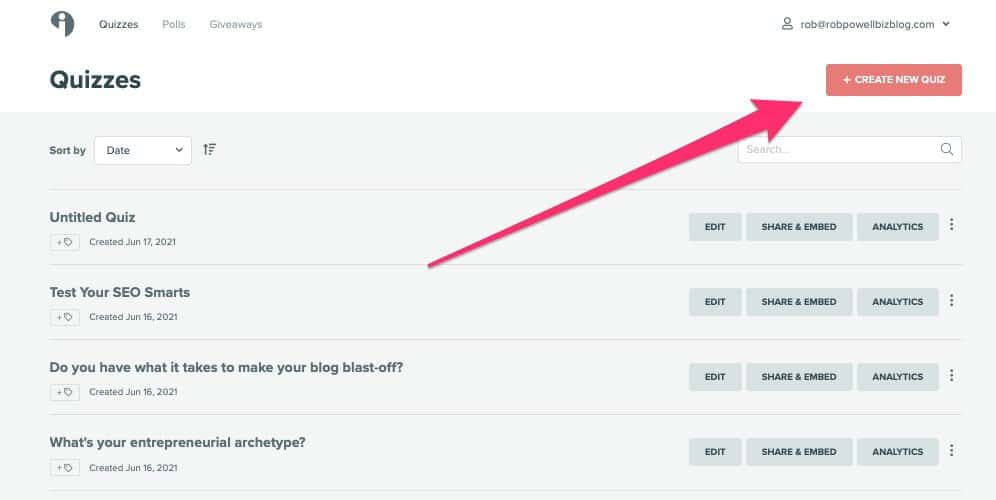
On the next screen, click ‘Start From Scratch’:
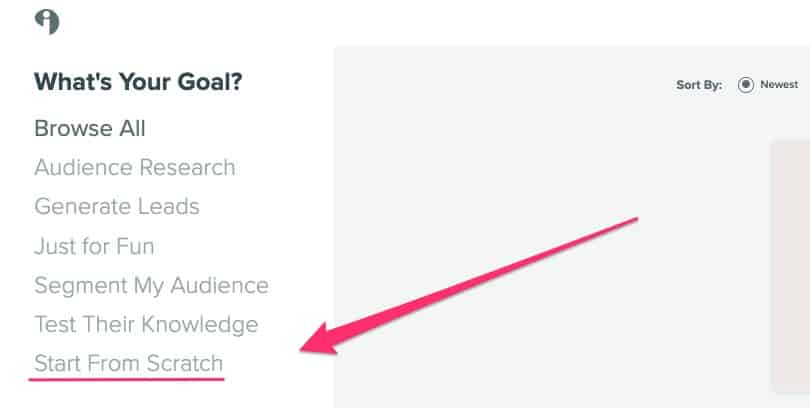
Next, choose ‘Scored Quiz’:
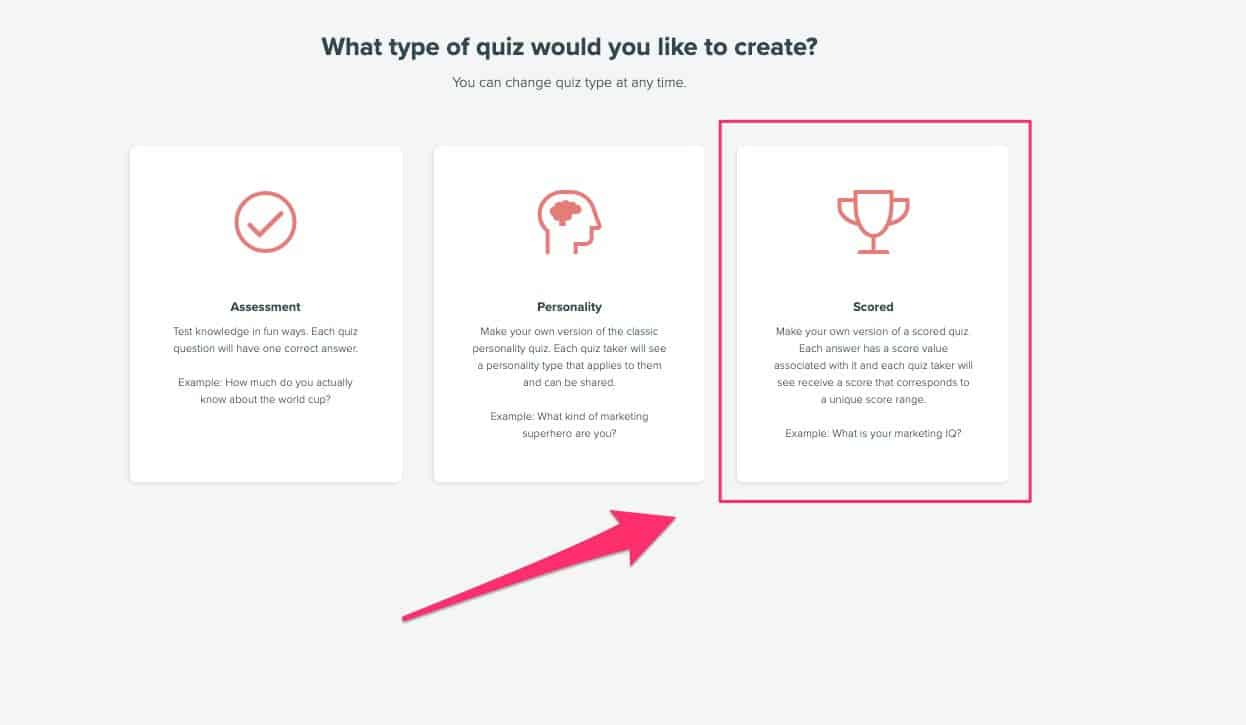
On the next screen, click on ‘Questions’ in the left side menu and then enter your first question.
Type in the possible answers below the question – you’ll need to use the ‘Add answer’ button for your third question:
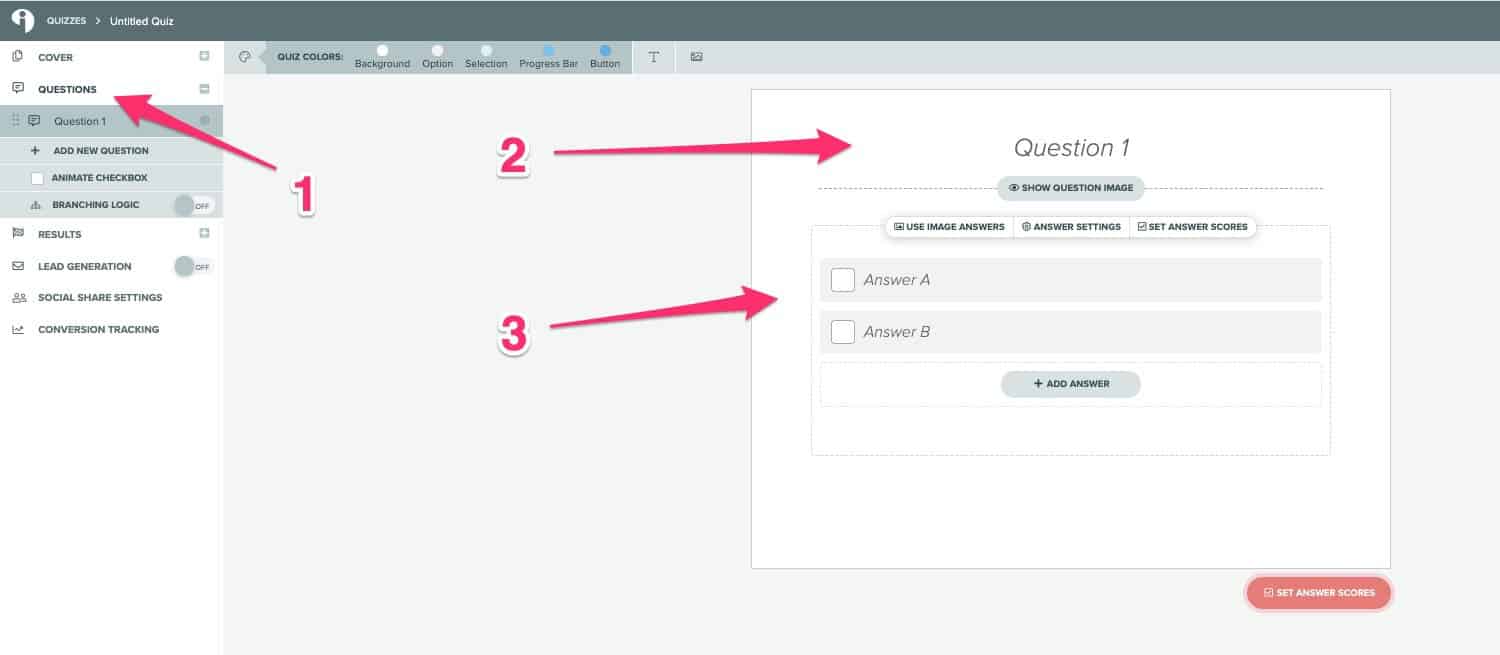
Then click ‘Add New Question’ and add your second question, and so on:
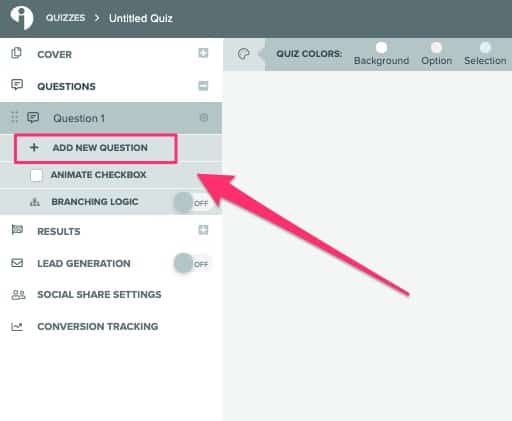
Step #3 – Set your answer scores
Next, click on the button that says ‘Set Answer Scores’:
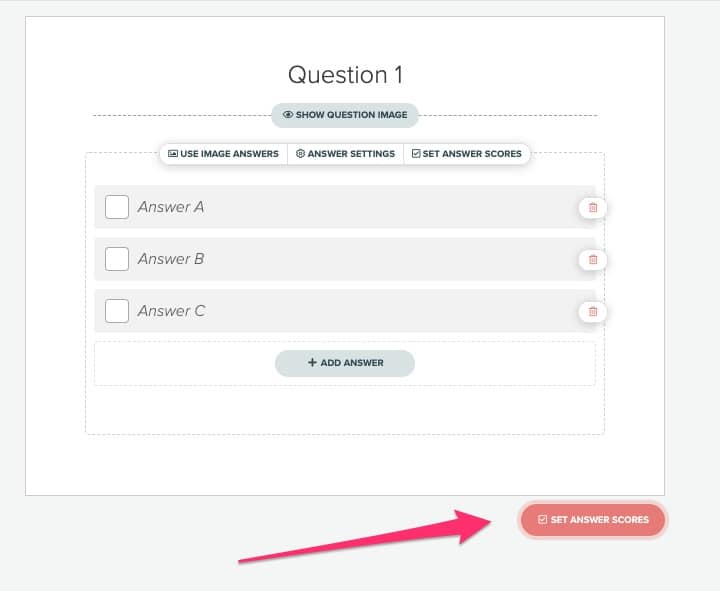
Now give a score to each of the possible answers.
Give the correct answer a score of 3, and score the incorrect answers as either ‘1’ or ‘2’:
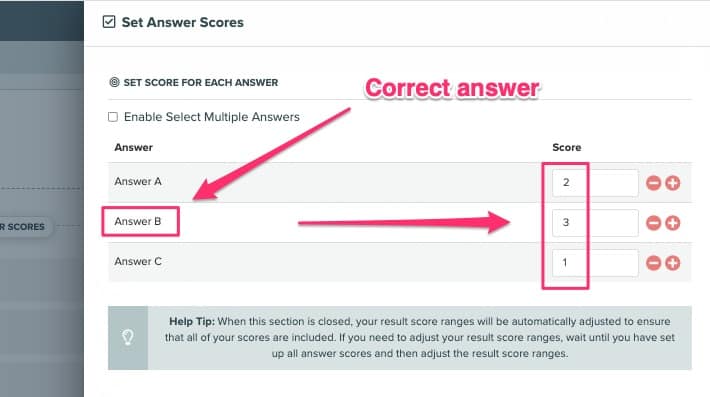
Step #4 – Create your quiz results
Once you’ve finished adding your questions and answers, click on ‘Results’ in the left side menu and create your first ‘result’.
In a scored knowledge quiz, you will usually have three possible results:
- Beginner
- Intermediate
- Pro
You can find more creative terms for these three levels, such as:
- You’re a Seedling – Keep Growing
- You’re Well On Your Way – Good Work
- Wow! You’re a Pro
Once you have assigned a score to each of the possible answers to your questions, the software will automatically set a range of scores that correlate with each result:
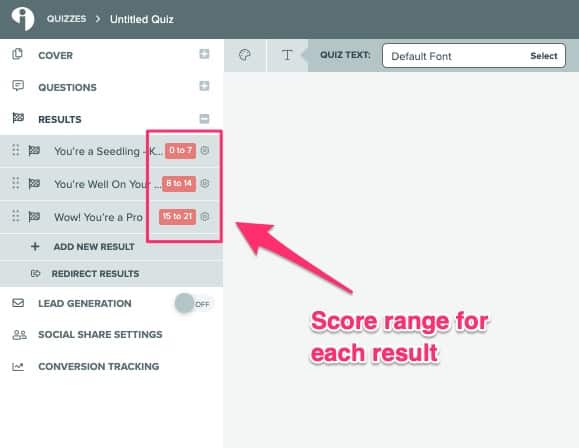
But you can adjust the score range for your results. To do this, just click on one of the three results and then click on the button that says ‘Result Settings’:
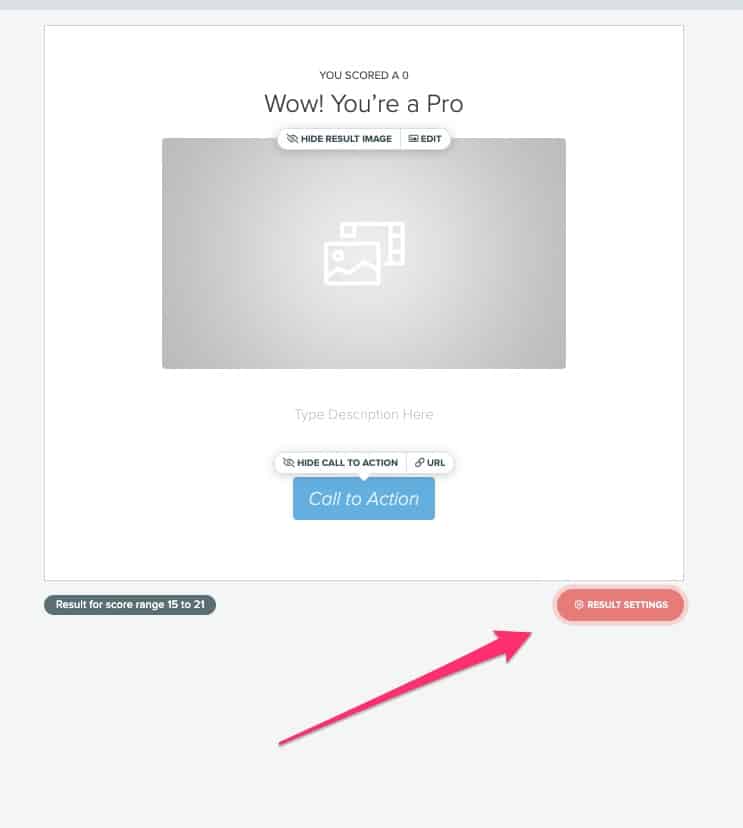
A window will then open where you can adjust the score range for that result:
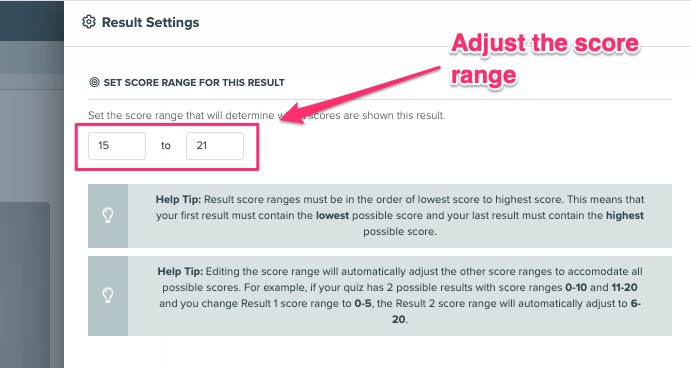
Let’s say you want to make it more difficult to qualify for the ‘Pro’ result: just increase the lower score:
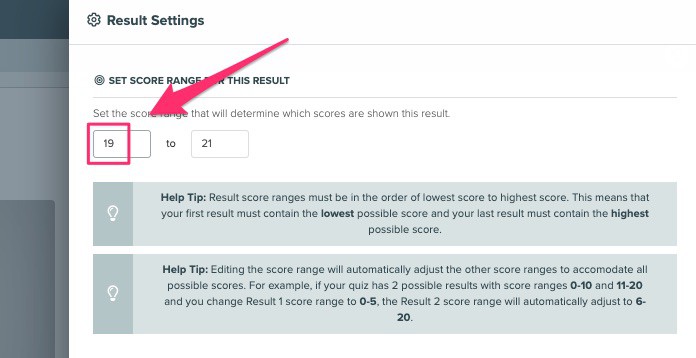
In the above example, I’ve increased the minimum score for the ‘Pro’ result to 19.
Here’s a really cool thing about Interact Quiz maker: when you adjust the score range for a really, the software automatically adjusts the adjacent result, to ensure there’s no overlap.
You can see this in the screenshot below:
The score range for the intermediate result was 8 to 14 and it’s now 8 to 18:
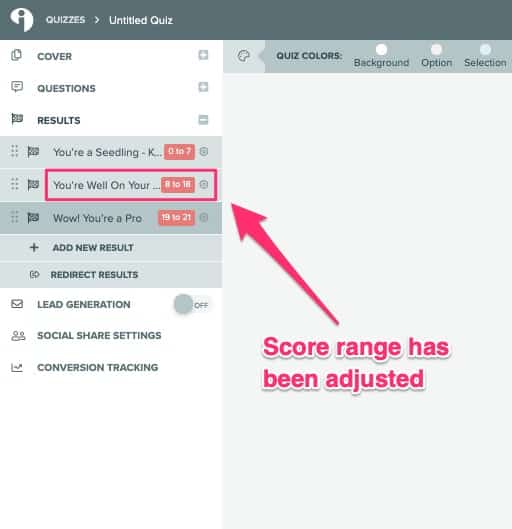
Step #5: Add your opt-in form
In this step, you gather email addresses and turn your quiz into a lead generation tool.
Click on ‘lead generation’ in the left side menu and toggle the button to the ‘on’ position:
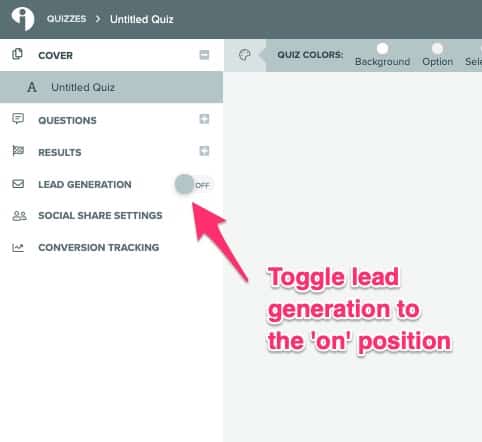
On the next screen, make any adjustments that may be necessary for your situation, and then click ‘Save and Continue’:
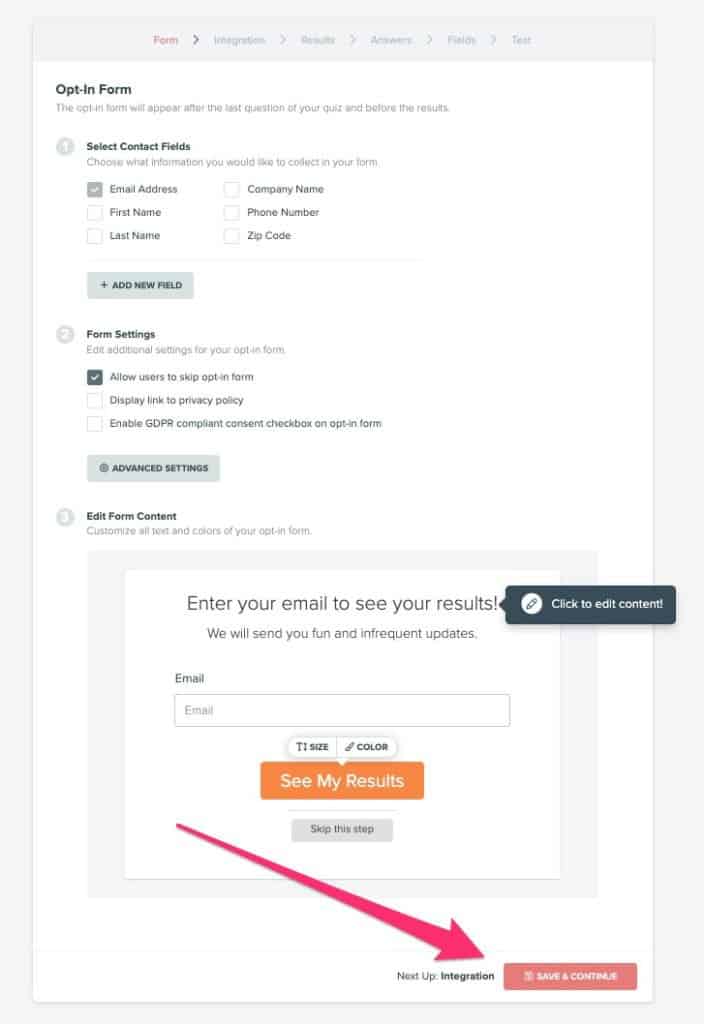
Next, choose your
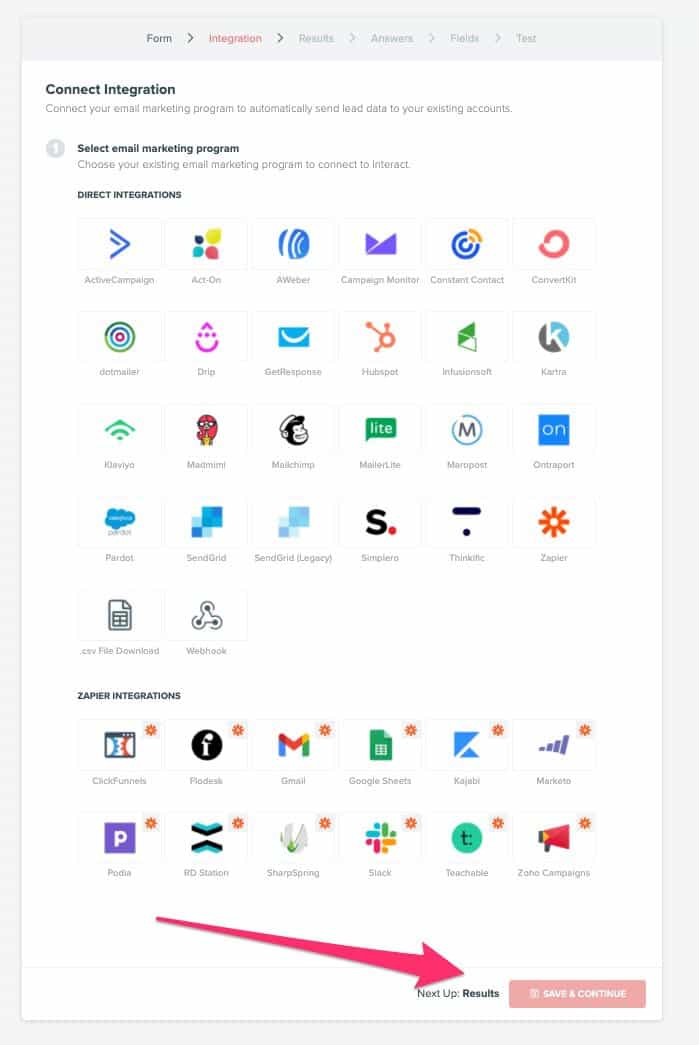
A new window will appear where you can map the results in your quiz to a group that you have set up within your

This is why quizzes are such a powerful
In the above example, I’ve created three groups within MailerLite (an
That will allow me to send emails with different types of content to these three different groups (someone who scored ‘Pro’ won’t want to see the same information as someone who scored the ‘Seedling’ result).
Conclusion
Lead generation quizzes are a terrific way to build your email list and get potential customers into your funnel.
They work well because they are fun and they turn passive browsers into engaged visitors. Start with Interact’s 14-day free trial and use one of their many templates. Adapt it to your niche or industry, embed it on your website, and watch your list grow!
Frequently Asked Questions
What are the most effective quiz tools for lead generation ?
There are several effective tools for creating lead-generation quizzes. Some popular options include Opinion Stage, Woorise, and involve.me. Each platform offers unique features that cater to different business needs, so it’s essential to explore each option and choose the one that fits your requirements.
How can I design a high-converting quiz lead magnet?
To design a high-converting
- Define your target audience: Understand who you’re trying to attract and tailor your quiz accordingly.
- Choose an engaging and relevant topic: Pick a subject that appeals to your audience and aligns with your marketing goals.
- Use engaging and clear language: Write quiz questions and answers that are concise, easy to understand, and attention-grabbing.
- Use attractive visuals: Incorporate eye-catching images and design elements to enhance the user experience.
- Create a lead capture form: Collect user information with a well-designed form, making sure to only ask for essential details.
What are the essential elements of a successful personality quiz?
The essential elements of a successful personality quiz include:
- Enticing titles and descriptions: Grab the audience’s attention with catchy headlines and interesting quiz descriptions.
- Relevant and engaging questions: Craft questions that pertain to the topic and facilitate self-discovery.
- Relatable and shareable results: Create personality types that resonate with the user and encourage social sharing.
- Targeted follow-up content or offers: Provide personalized content, product recommendations, or email campaigns based on quiz results.
How can I optimize the questions in a lead generation quiz?
To optimize quiz questions for
- Focus on your audience’s needs: Ensure that each question provides insights for both you and your users.
- Keep it simple: Limit the number of questions and use a concise, straightforward writing style.
- Use a mix of question types: Employ multiple-choice, ranking, or slider questions to keep users engaged and gather more valuable data.
- Ensure relevance: Make sure each question is significant and ties back to your objectives.
- Test and refine: Analyze quiz performance and user feedback to identify areas of improvement and optimize accordingly.
What strategies can be used to promote a lead generation quiz?
Promote a
- Social media: Share quizzes on popular platforms like Facebook, Twitter, and Instagram, utilizing engaging visuals and captions.
- Contextual targeting: Embed your quiz on targeted blog posts or website pages that align with your quiz topic.
- Email marketing: Include the quiz in your newsletters or create a dedicated email campaign to grab users’ attention.
- Paid advertising: Use search or social ads to reach a wider audience and target demographics more likely to engage with your quiz.
How do I track and analyze quiz performance for better lead generation ?
Tracking and analyzing your quiz’s performance can be achieved through various methods:
- Use built-in analytics tools: Many quiz platforms provide built-in analytics to analyze data such as completion rates,
lead generation numbers, and more. - Integrate with third-party analytics: Connect your quiz with tools like Google Analytics to obtain in-depth insights and user behavior patterns.
- Monitor social sharing: Keep track of how your quiz is being shared across various social platforms and gauge its popularity.
- Compare results with goals: Regularly evaluate your quiz’s performance against your predefined objectives and adjust your strategy as needed.